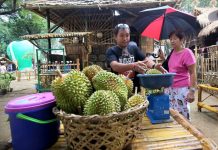The Department of Agriculture must prevent the infestation of flies in areas affected by bird flu to avoid the transmission of H5 strain of the avian influenza to other parts of Luzon, an inventor said Tuesday.
Davao Inventor Association president Virgilio Sangutan told reporters that the odor emanating from chicken carcasses would attract flies that can transmit the virus to provinces near Pampanga and Nueva Ecija in Central Luzon.
He said the virus can be transmitted not only through humans or chickens that have made direct contact with an infected bird but also by flies that “can worsen the virus contamination” and spread it to other areas.
“The problem (in containing) avian flu, we should not only control the movement of the humans but also of the flies because they can travel from one poultry farm to another poultry farm. We must control the odor because without the odor, there will also be no flies,” he said.
He said flies can accurately smell the dead animals or a poultry farm seven kilometers away.
In a press release on August 24, Agriculture Secretary Manny Piñol assured the public of “the full containment of the spread of the dreaded avian influenza to the rest of the country, saying he felt relieved that strict quarantine measures were put in place as soon as the Department confirmed it.”
Piño said a total of 476,640 fowls were culled in San Luis, Pampanga, which included 331,150 layer chickens, 33,930 broilers, 32,850 ducks, 72, 190 quails, 158 pigeons, and 197 gamefowls.
In Jaen town, a total of 114,850 quails were culled while a total of 70,100 layer chickens were culled in San Isidro town, both in Nueva Ecija.
The secretary issued Administrative Circular No.08 dated August 22 lifting the ban on the movement of live birds, poultry products including poultry meat, eggs and other products from Luzon to the Visayas and Mindanao.
In a text message on Wednesday, Dr. Dannie Apelo, avian flu spokesperson of DA 11, said that even as the ban on Luzon poultry products had been lifted, suppliers must present documents certifying that their products came from bird flu-free areas.
Dr. Arlene Vytiaco, avian influenza focal person of the Bureau of Animal Industry, said the Australian Animal Health Laboratory has confirmed through genetic sequencing tests that the avian flu strain that hit San Luis, Pampanga was of the highly-pathogenic H5N6 which has a history of transmission to humans.
Vytiaco said that while the avian influenza type A H5N6 virus could be transmissible to humans, there is very low possibility of animal to human transmission. (MINDANEWS)






